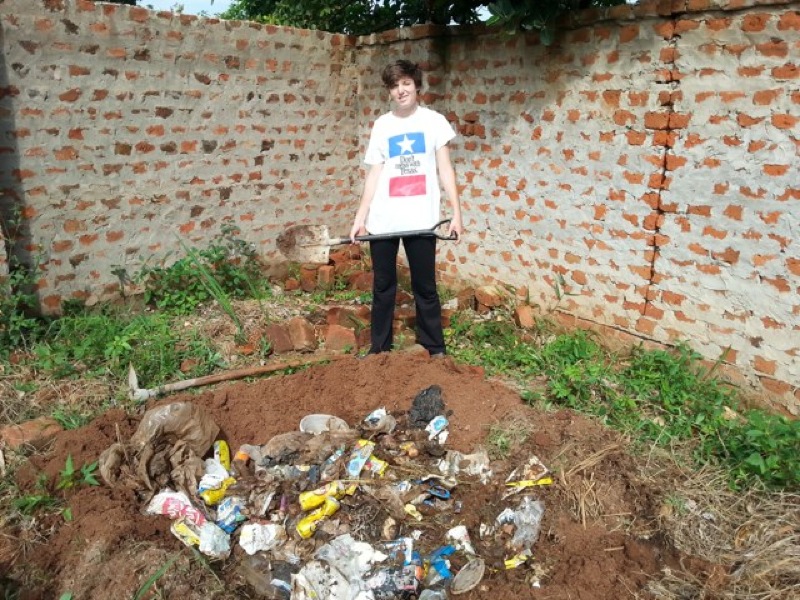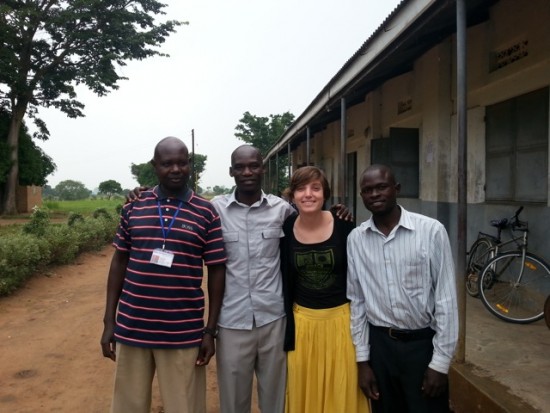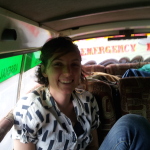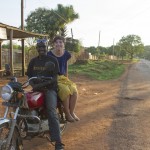Reshaping Environmentalism in Uganda


Won’t you get the flu?”
I sit atop a stack of scraps as a carpenter planes the boards I’ve ordered for my new personal project – a chicken coop – and the fine sawdust blends with the usual dust of Gulu town to create a feat for my respiratory system.
The carpenter insists that I’ll get the flu, or, in American terms, some congestion and cough. He begins to joke that the expected lifespan in Uganda is already low, but that everyday he spends breathing in this dust pulls his maximum age down lower on the spectrum. I admit that over the last few days I have been relying on tissues. My sneezing started after a full day spent in a field of tall grasses, and my nose has been itching at the first scent of any other irritant.
“Ah, you are also losing some of your life by living here in Uganda! All the American women that have stayed home get to keep their numbers high but you are taking a portion out!” I heartily deny it, but he shrugs each and every comment off.
On a daily basis and at random intervals, I –and all of the other residents of Gulu– inhale all manners of dust, exhaust, and smoke from burning fields and rubbish pits. For many Americans, such conditions can seem like an environmental nightmare, particularly when they experience it in full doses on some of the crowded streets of Kampala. Expats joke of absent regulations while often paying another source to sort out where their trash ends up.
That’s what we’re used to – the yearly inspection preventing the black cloud behind the car, the mess disappearing from our curbside once a week. Out of sight, out of mind.
But when you’re digging your own rubbish pit, and facing the prospect of the smoke drafting in through your open windows and onto your freshly hand-washed clothes, you realize just how much waste there really is in the world. Just how much plastic is used as a simple conveyor of processed goods, doomed to reenter the atmosphere as harmful chemicals. You dream of recycling bins and find creative uses for old bottles, like germinating seeds or as pins for slip-n-slide human bowling.
Despite the perception that a street back home is cleaner and the habits more environmentally friendly, the reality is that energy consumption per person in a country like Uganda is significantly lower than that required to maintain a “minority world” lifestyle.
In his short talk “The magic washing machine,” statistician Hans Rosling breaks this energy consumption down into simplified units and terms, and recognizes that “Half of the [world’s] energy is used by one seventh of the world’s population,” eaten up by a mechanized lifestyle. The increased “efficiency,” depending on how you look at the term, leads only to even greater consumption, while in the other sixth-sevenths of the world’s population, women generally end up with the duty of trying to make up the difference.
Each week I stare down my rubbish pit and fail to burn it. I see how quickly some things break down – and how others never disappear. Each week I spend at least three-and-a-half hours hand washing my clothes, and though, let’s be honest, some of the time may be spent working against lack of practice, this is the number reached even with no children to care for and with access to running water within the confines of my own home.
On my commute to work at a secondary school each day, I witness women and children ranging in ages from 4 to 74 walking various distances to fetch water by hand and carry the weight back home, multiple times a day. I see cattle yoked together for those lucky enough to pay for a plowing of their field, saving them from days of work by hand. I see petrol-efficient motorcycles loaded to their maximum, carrying goods between one place and another, matatu taxis filled to the brim with people, and many others walking and riding bicycles. I see people capable of producing large quantities of their own organic food, sharing meals in modest living spaces, not grand architectural schemes.
And yet individuals from minority world countries insist that they’re leading the green movement. Yes, we have the technology and resources that help make strides towards a more clean energy world. All individuals and countries will need to make adjustments to prevent environmental breakdown under the burden of billions of people (and the number is growing) needing to eat. But the minority world continues to consume so much more. And, above all else, we have the luxury of choice. To choose to be “green” here and there, but remain with the comfort of a personal car and the magic washing machine.
Meanwhile, many in the majority world often have no choice. Water is only fetched by hand because the infrastructure is lacking. Many only walk miles each day because they cannot afford a faster form of transportation. “Organic” food is a foreign concept because fertilizers and chemicals are a rare necessity, and a scarcely obtainable resource.
Environmental concerns for sustainability are inextricably intertwined with human rights and development – though oftentimes treated as mutually exclusive. Community-based conservation efforts focused on benefits sharing try to change this, but the attitude and efforts on the part of environmental activists and development workers, as a whole, needs to shift.
Those women who carry on fetching the water, washing by hand … they are often prevented from spending that time participating in an income-generating activity that may fund their children’s education or lift their family from poverty. Preventing them from hitting the markers of development that we so fervently attempt to measure.
As a minority-worlder working in such a sector, I’m focusing more and more on this divide. And as Rosling hints at it, I don’t think we have the right to deny those climbing up the energy consumption ladder, particularly if we aren’t willing to climb down it.








